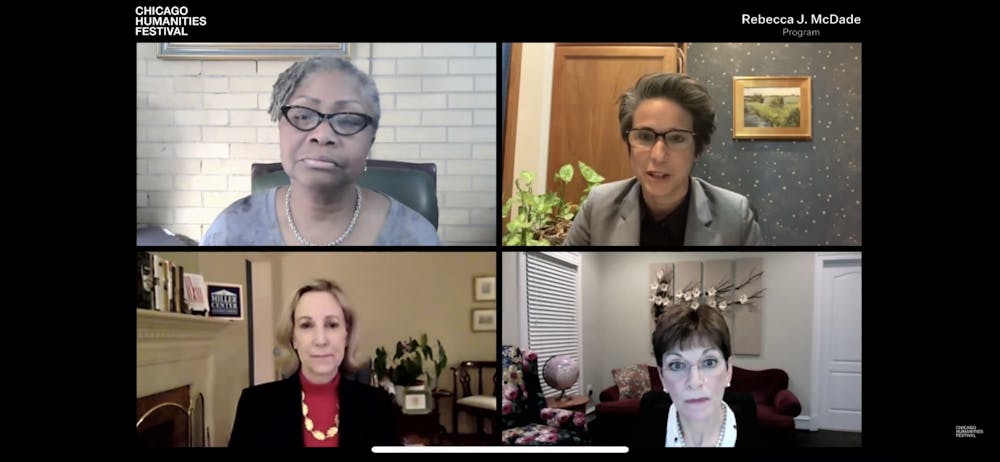Four political scholars gathered virtually to discuss political polarization at a Chicago Humanities Festival panel Wednesday night. Among them was Barbara Perry, director of presidential studies at the Miller Center, Amy Walter of The Cook Political Report, Valerie C. Johnson of DePaul University and political columnist Mona Charen from The Bulwark, who moderated the discussion.
The event was a fundraiser for the Chicago Humanities Festival, a year-round festival of the arts that works to make arts and cultural programming more accessible regardless of age, income, race and physical ability. While events normally take place in venues across Chicago, this year the festival expanded to digital programs because of the pandemic. The panel was live-streamed on YouTube, and as of Friday, the video has over 200 views.
The discussion centered on determining if the United States is the most divided it has ever been or if the country can find a historical precedent for its polarization. Additionally, the panel discussed whether this polarization is an asset or a hindrance to the health of democracy.
According to a 2020 study by researchers at Brown University and Stanford University, political polarization in the United States has grown rapidly over the past 40 years. Using ratings from public opinion surveys, they found that in 1978, the average American rated members of their own political party 27 points higher than members of the other political party on a scale from 0 to 100. By 2016, however, Americans on average began rating members of their own political party 45.9 points higher — negative feelings towards the other political party increased by an average of 4.8 points per decade.
The panel began with remarks on the recent guilty verdict of Derek Chauvin — a police officer convicted Tuesday of the murder of George Floyd in Minneapolis last May. In an incident captured on video, Chauvin knelt on Floyd’s neck for nine minutes and 29 seconds. Despite Floyd’s repeated statements that he couldn’t breathe, Chauvin continued pinning him down and kept his knee on Floyd’s neck even after Floyd became motionless.
Charen mentioned that, according to a poll from USA Today Tuesday night, 71 percent of Americans agree with the verdict, including the majority support of both political parties. According to the panel, when the video of Floyd’s murder first surfaced, it demonstrated the present need for justice and became an event that many Americans could unify around.
However, when this flashpoint was usurped by political forces within the media controlling the narrative, political polarization surged, according to Walter. Media outlets, designed to make a profit from continually generating outrage, demonstrated how quickly a unifying event can change.
The discussion pivoted to broader issues and principal drivers of partisanship in the United States. According to the panelists, Americans are less partisan but more polarized than ever, meaning that partisanship is rather driven by a hatred of the other side.
“We are the most divided we’ve ever been since the Civil War,” Perry said.
She explained how, in her view, the current political climate supersedes the social discord and violence of the 1960s, “bringing us back to [the level of polarization before] the Civil War.”
Charen then posed the question of why the country is polarized and whether it is because of misunderstandings of the other parties.
“We can’t just agree on priorities, we can’t agree on the facts that inform those priorities,” Perry said.
The idea, Perry said, can be extended to the current populist, anti-elite movement that accounts for a lot of the mistrust of leaders and scientists surrounding the coronavirus response and vaccine.
Returning to the national scope of current politics, the panelists discussed a resurrection of localism to offset polarization.
Perry invoked the founders and their ideas surrounding factionalism and federalism to describe what has changed in our political system that could account for this polarization. In order to prevent the concentration of power at the federal level, and by extension tamping down factionalism, the framers laid out a government composed of three branches at three levels. With national politics overshadowing local and state politics, the U.S. has seen the rise of what the framers called “factionalism,” Perry said.
Walter ended the conversation by saying citizens must learn to have conversations framed as seeking to understand where people are coming from, rather than to rail against “rightness” or “wrongness” of the other side.







